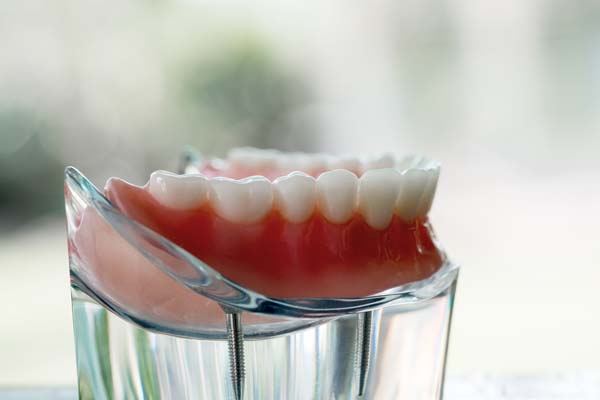Getting Dentures to Replace Missing Teeth

If you are missing one or more teeth, you have several tooth replacement options from which to choose. One such option is dentures. Though dentures are no longer the preferred tooth replacement option for neither dentists nor patients, they continue to have a purpose. For some people, dentures are the only option. For others, they offer the affordability that other, more intensive restoration methods, such as implants, cannot provide. Regardless of your reason for choosing dentures, there are a few things you should know about this common prosthetic.
Types of dentures
Dentures fall into two main categories: complete and partial. Which type a dentist recommends depends on how many teeth a patient is missing and whether the teeth adjacent to the gap are healthy.
A complete denture is designed to replace all the teeth in a single upper or lower arch. A partial denture, on the other hand, can help to replace anywhere from one to a handful of teeth. Partial dentures utilize ceramic or metal clasps, which anchor onto healthy teeth that are adjacent to the gap.
In some cases, dentists recommend a hybrid approach that utilizes both dentures and implants. They refer to such a setup as “implant-supported dentures.” With implant-supported dentures, a dentist may install one or two implants adjacent to a gap to serve as support for a partial denture. Implant-supported dentures are more durable than standard full or partial dentures.
Living with dentures
Dentures require wearers to make significant adjustments to their lifestyles in the early days of use. They also require substantial care and maintenance. Below are just a few things tooth loss patients must understand about life with dentures.
Dentures affect speech
Teeth play a large role in how one speaks. When individuals lose teeth, their speech becomes impaired. While dentures help to correct speech hindered by missing teeth, they often make it difficult for wearers to talk for the first few months. This is because dentures sit loosely along the gum line and shift around as the mouth moves. As a result, wearers must practice talking in the early days of denture use.
Dentures affect diet
Though dentures resemble teeth, they are much weaker than the real deal. Also, because of how they are constructed, they make it difficult for wearers to chew their food comfortably or effectively. As a result, dentists recommend that denture patients stick to soft foods they can chew easily.
Dentures affect oral health
Again, though dentures resemble teeth, they are far from capable of providing the benefits that actual teeth and implants offer. One such benefit is jaw and bone support. After as few as six months of wear, the jawbone may begin to deteriorate and the gums to shrink. Either occurrence can cause dentures to become ill-fitting and for any remaining natural teeth to become loose and fall out. To help with the loose-fitting dentures, patients must undergo fittings for new sets every six months to a year. There is little a dentist can do to correct a shrunken jawbone, though.
Conclusion
Dentures are a common and effective tooth replacement option. If you are interested a complete or partial set, discuss the pros and cons with your dentist today.
Request an appointment here: https://DesertBloomDentistry.com or call Desert Bloom Dentistry at (928) 428-1617 for an appointment in our Safford office.
Check out what others are saying about our dental services on Yelp: Dentures and Partial Dentures in Safford, AZ.
Related Posts
If you are a denture wearer, you will probably need a denture repair at some point. A broken denture can be very unsettling. It prevents a person from doing some of the most basic things, like eating and talking to others. There is an ongoing debate whether it is advisable to DIY a broken denture.…
Dental veneers are popular cosmetic dental solutions. The main goal of this treatment is to improve the appearance of teeth. These are quick dental restorations with dramatic results. Dental veneers can also improve the structural integrity of your teeth. If you want to know how this happens, here are the details.Dental damage is common. Cracking…
Gum disease affects more than half of all adults in the United States, according to the International Journal of Health Sciences, and there are different forms of the condition. Gum disease is prevalent and one of the major causes of tooth loss. Therefore, it helps to understand the various stages of gum disease and its…
Dental crowns are one of the versatile restorations used in dentistry. Crowns are used to save damaged teeth that cannot be saved using less invasive procedures. Damage can occur to teeth at any time, leaving them severely compromised.Placing a crown on a tooth requires making permanent alterations by removing enamel to create a better fit.…
